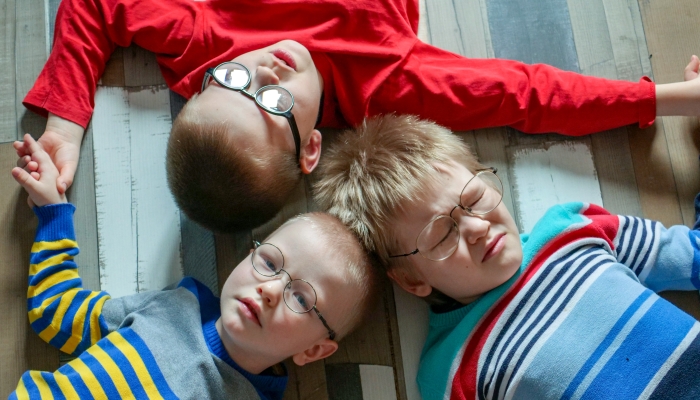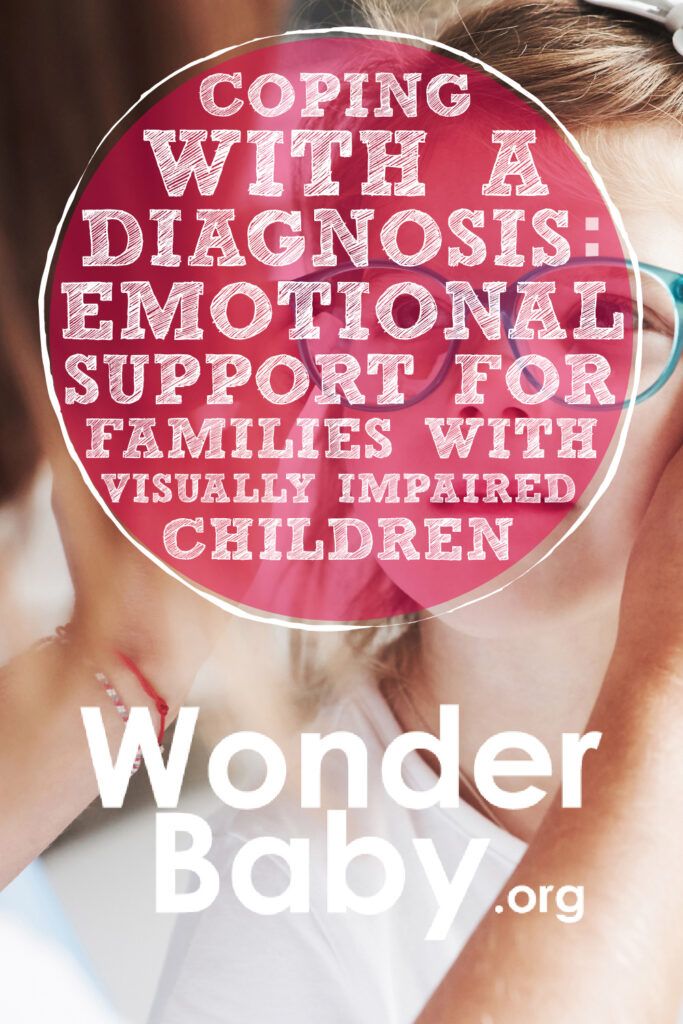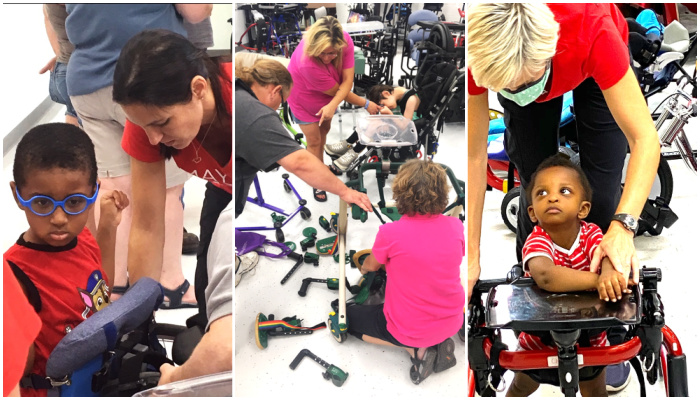Coping with a Diagnosis: Emotional Support for Families with Visually Impaired Children

- Families with emotional support are more resilient and cope well with their child’s medical needs.
- Establish emotional support with peers, professionals, and the community.
- Educate your family and friends about your child’s diagnosis and your family’s specific needs.
- Utilize the knowledge of your child’s care team to foster independence and build social connections for your child.
- Focus on your self-care to reduce stress and burnout.
When you first receive a diagnosis that your child has special medical needs, it feels overwhelming. You will probably experience a range of emotions.
Questions, fears, and uncertainty for the future can increase stress within any family. As your child develops, new worries and concerns may arise.
Implementing strategies early on to help cope with your child’s new diagnosis will increase your family’s well-being. Emotional support for families with visually impaired children can help families cope well.
The Importance of Emotional Support

Families tend to have higher levels of stress, depression, and anxiety when a child is diagnosed with a medical condition. Higher levels of stress can negatively impact parenting and family functioning.
But there is hope for parents of visually impaired children. According to an Infants and Young Children Journal article11. Barnett, D., Clements, M., Kaplan-Estrin, M., & Fialka, J.. Building New Dreams: Supporting Parents’ Adaptation to Their Child With Special Needs. Infants & Young Children. 2003;16(3),184-200. https://journals.lww.com/iycjournal/fulltext/2003/07000/building_new_dreams__supporting_parents_.2.aspx, research shows that families with emotional and social support are more resilient and are better prepared to cope with their children’s increased needs.
Emotional support is considered an important protective factor. A protective factor is a characteristic that reduces the likelihood of negative outcomes.
Positive emotional support can:
- Impact mental well-being
- Prevent depression or anxiety disorders
- Strengthen family bonds and understanding
How to Find Emotional Support
Emotional support can help you process your child’s new diagnosis or help you throughout your child’s growth and developmental milestones. Emotional support is beneficial at the beginning of your child’s diagnosis and throughout your life.
Establishing emotional support with peers, professionals, and the community can positively impact your family’s well-being.
Professional Counseling and Therapy

There is no right or wrong way to cope with your child’s diagnosis. It is normal to feel a range of emotions. At times, you might feel anger, anxiety, grief, confusion, or guilt, among other emotions. A professional therapist can help you acknowledge and embrace these ranges of emotions.
In addition, a professional therapist can help you enhance coping skills as your family adjusts. Your child’s visual impairments will impact the whole family. To increase communication and support within the family, you can explore:
- Individual therapy for parents and siblings
- Family therapy sessions
- Support groups for families with visually impaired members
Talking through your concerns with a neutral professional therapist can be helpful for your family’s mental well-being.
Community and Peer Support

When a child is first diagnosed with a disability, a family can feel very isolated. You might not know other visually impaired or blind children. Your family and friends might not know how to help or understand your needs.
If your child is under the age of three, early intervention services can help your family navigate your child’s new diagnosis. According to a practice report published in 202322. Chen, D., & Groves, C. C.. Providing Emotional Support to Parents and Caregivers of Infants and Toddlers With Visual Impairments. Journal of Visual Impairment & Blindness. 2023;117(2), 175–182. https://doi.org/10.1177/0145482×231169721, it is essential that early intervention professionals provide emotional support for families with blind or visually impaired children. Early intervention professionals can help you:
- Connect with other families in similar situations
- Find local and online support groups
- Share stories of success and overcoming challenges
If your visually impaired child is over three, you can find support services through your child’s school, medical team, or online. National organizations include the National Organization of Parents and Blind Children and The National Federation of the Blind. These organizations are raising awareness and understanding of vision impairment by providing information, support services, and education.
Another national organization, The American Foundation for the Blind, provides programming through Family Connect, a helpful website providing access to peer support, tools for families, education, and resources for visually impaired children and their families.
Finding online or in-person support from other families with children with visual impairments will improve your family’s well-being.
4 Strategies for Families to Cope and Thrive
Families with children who have low vision, are blind or visually impaired, or have other disabilities can thrive with a healthy support network and other strategies. When feeling overwhelmed, focus on the following suggestions to help you cope.
1. Promote Open Communication within the Family

Your child’s vision impairment impacts your entire family. It’s important to remember that regardless of any diagnosis, your child is still your child. They do not have to be defined by their disability. Remember to embrace them for who they are.
Acknowledge your child’s feelings associated with their visual impairments. Take time to listen and validate your other family members’ emotions, too. Don’t try to change or fix their emotions. It is okay for them to be angry, frustrated, scared, or any feeling they are having. Create a space for them to share and express those emotions openly.
Give yourself and everyone in your family time to adjust. Take time to nurture your relationship with each member of your family. If you have a spouse or other children in the home, set aside time to be present with them as well.
2. Educate Extended Family and Friends

Your extended family and friends probably don’t understand what you are going through. They will want to help but might not keep in touch because they don’t know how to help. When overwhelmed, it is common for individuals to shut down and not reach out for help.
Prioritize staying in touch with your family and friends; they are your personal support network. With guidance and understanding, they can help. Identify which friends are good listeners that you can talk with. Educate your support network about your child’s specific visual impairments. Address any misconceptions they may have about visual impairment.
When reaching out to your support network, share your specific needs and ways they can assist. It can be helpful to make a list of things that would help your family and when asked select an item off the list.
3. Foster Independence in Your Child Whenever Possible

Learn as much as possible about your child’s eye condition. Talk with early intervention specialists, medical and eye doctors, and other professionals to learn how to help maximize your child’s potential. With your child’s support team, you can learn how to implement strategies in the home that will enhance your child’s independence.
Fostering independence in children and young people with visual impairments will boost their self-esteem and enhance their everyday experiences.
Seek support from your child’s care team to focus on your child’s everyday life and particular issues relating to your child’s independence. Create a home environment that is more accessible to your child’s visual impairment. Encourage your child to explore safe areas to gain more spatial awareness. Learn ways to build adaptive skills at home for your child to learn everyday life skills.
Children with visual impairments thrive when braille books, toys, clothing, and other daily essentials are easily accessible and in a predictable location. Help your child learn to utilize the available assistive technology that best meets their vision needs.
All children experience challenges throughout development. Do not compare your child’s development to other children. Instead, contact your early intervention professionals or other professionals on your child’s care team to create realistic milestone goals that support your child’s blind or visually impaired needs and happily celebrate even the smallest milestones.
4. Prioritize Self-Care for Parents and Caregivers

Take care of yourself first. It’s common for parents to focus all their attention on their children and ignore their own needs. When you have a child with a vision impairment or multiple disabilities, it can feel hard to set aside time for yourself.
Focusing on your self-care can reduce stress and burnout.
Burnout occurs when you have prolonged or chronic stress. Understanding the signs of burnout can help parents seek the help they need to cope. Early signs of burnout might include:
- Feeling exhausted-physically or mentally
- Feeling hopeless
- Unable to cope
- Sleep issues-insomnia or sleeping often
- Loss of interest or pleasure in previous hobbies
- Irritability
If you think you are experiencing burnout, talking with a professional and focusing on self-care can be beneficial.
Self-care isn’t just bubble baths. Self-care is about focusing on your physical, psychological, professional, personal, spiritual, and emotional needs. Self-care activities may include:
- Fostering friendships
- Getting coffee with a friend
- Practicing asking for and receiving help
- Self-compassion
- Finding a hobby
- Singing, dancing, or playing
- Relaxing in nature
- Setting boundaries at work
- Learning to say ‘No’
- Getting regular medical care for yourself
- Getting enough sleep
- Going to therapy
- Joining a prayer group
If you are feeling overwhelmed, start with one small self-care strategy.
Preparing for Future Challenges
As you navigate your child’s visual impairment, seek out professionals and services knowledgeable about children with visual impairments. Utilize supportive services from national organizations, university-affiliated hospitals, and other specialists to ensure your child has the best medical care and treatment plan.
Keep records of doctor information, specialist reports, and Individualized Education Plan (IEP) documents. Doing so will help you feel more prepared for future challenges and milestones for your child.
Navigating the Educational System

When your child enters the school system, seek support from the school’s special education programs. Children that are blind or visually impaired or with low vision will qualify for a specialized plan to guide their school programming.
This specialized plan, called an Individualized Education Plan (IEP), will serve as your child’s roadmap to services within the school. It will outline the resources, services, and tools accessible to your child.
Collaborate with teachers and school counselors to ensure your child is getting their educational needs met, and are supported in the classroom. Build strong relationships with the teachers and educational team.
Social Challenges and Building Friendships

You can help your child build friendships and have positive social interactions by raising awareness of children who are blind. Encourage the school to provide educational opportunities for students to learn about vision loss and other disabilities.
Parents and teachers can also help students learn ways to interact with children who are blind or visually impaired.
Teachers can encourage your child with vision impairment to participate in smaller group activities with other peers and encourage participation in social activities in the classroom setting.
Help your child learn about social interactions through play. Since your child can’t observe nonverbal social cues or physical gestures, help them to understand social interactions through prompts and practice.
Help your child understand bullying and the importance of seeking help from a teacher or other adult. If you have a concern about your child’s social interactions, speak with your child’s educational team for support.
Planning for Adulthood
Parents can help their child with low vision or visual impairment prepare for adulthood by fostering independence at an early age. Teach your child independent living skills that are essential in the real world.
Transition meetings are available for your child through their school and IEP. Be involved in the transition meetings to help make a plan for your child’s transition to adulthood. Begin conversations early about vocational training and career guidance while your child’s school is available to offer support and services.
References:
- Barnett, D., Clements, M., Kaplan-Estrin, M., & Fialka, J.. Building New Dreams Supporting Parents’ Adaptation to Their Child With Special Needs. Infants & Young Children 16(3), 184-200, July 2003. https://journals.lww.com/iycjournal/fulltext/2003/07000/building_new_dreams__supporting_parents_.2.aspx
- Chen, D., & Groves, C. C. (2023). Providing Emotional Support to Parents and Caregivers of Infants and Toddlers With Visual Impairments. Journal of Visual Impairment & Blindness, 117(2), 175–182. https://doi.org/10.1177/0145482×231169721

Related Posts

Eye Conditions and Syndromes, Visual Impairment
Neuralink Announces Plans to Restore Sight to the Blind with Brain Chip
Elon Musk’s company Neuralink has announced plans to begin human trials of its new “Blindsight” brain chip by the end of 2025.

Visual Impairment
The Gift of Understanding: How a Young Child Helps His Blind Father Navigate Life
When a parent is blind, it’s natural for people to wonder how their sighted child will adapt. Will they struggle to understand their parent’s needs? Will they feel burdened by...

Assistive Technology, Support
May We Help: Engineering Independence for People with Disabilities
May We Help is dedicated to designing and building custom solutions that help individuals of all ages achieve mobility, access, and independence, all at no cost.